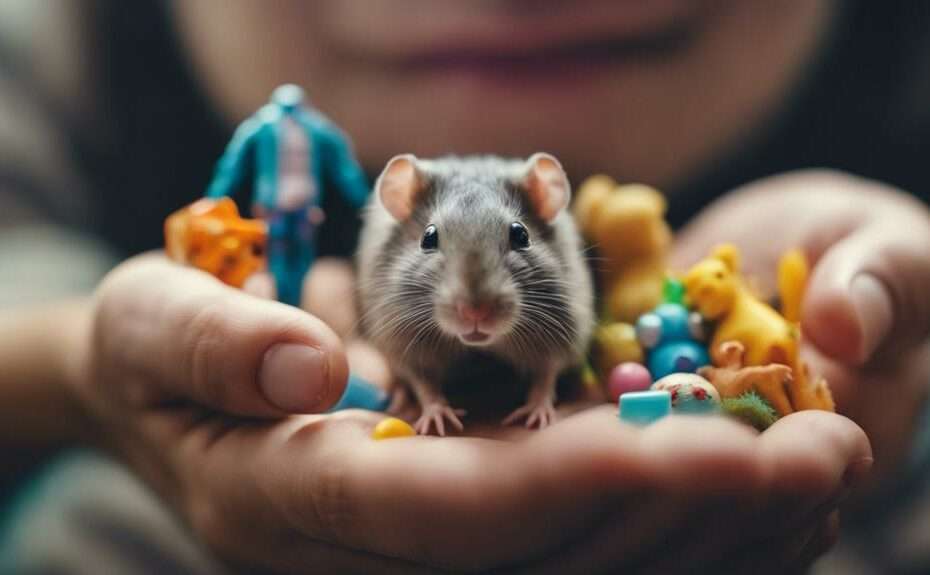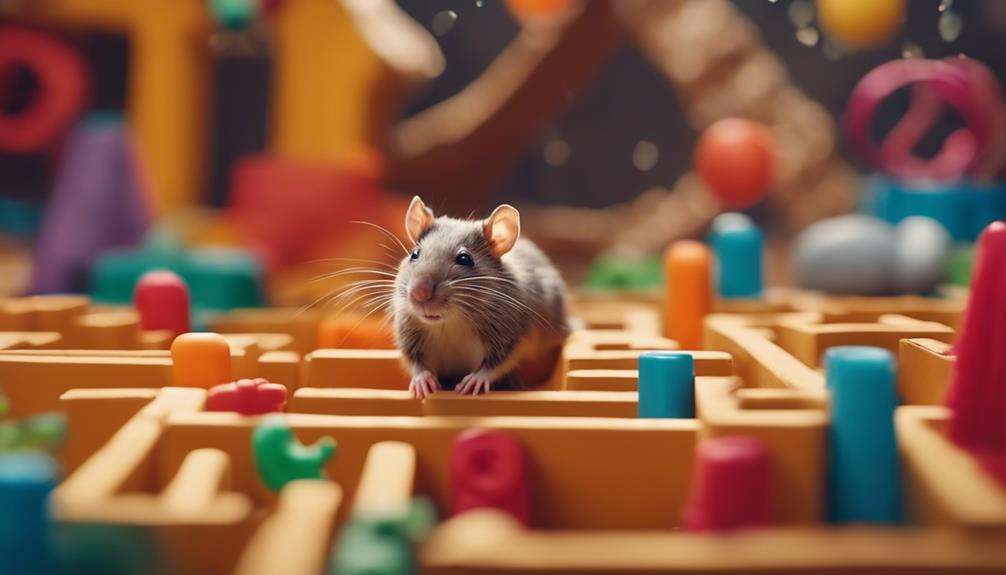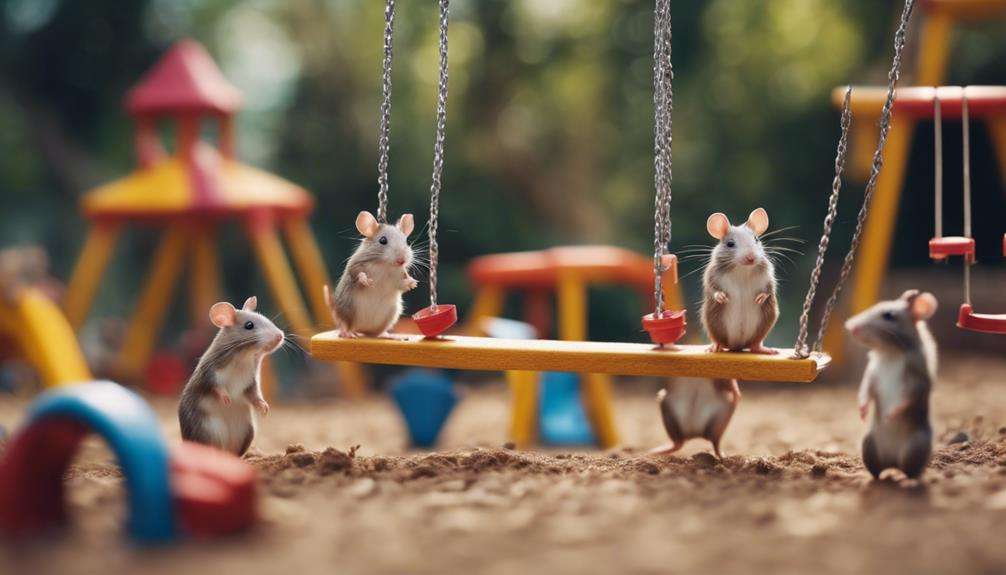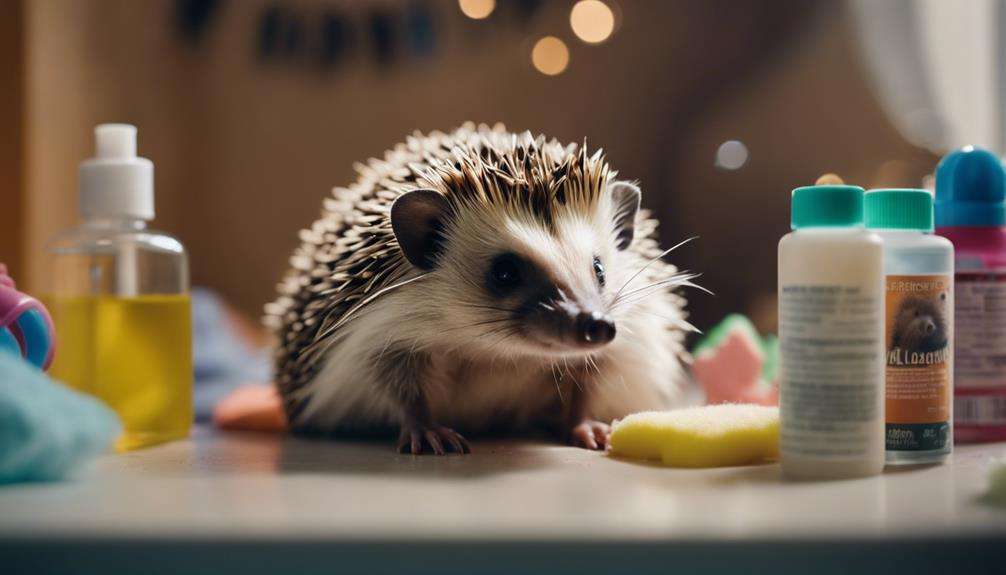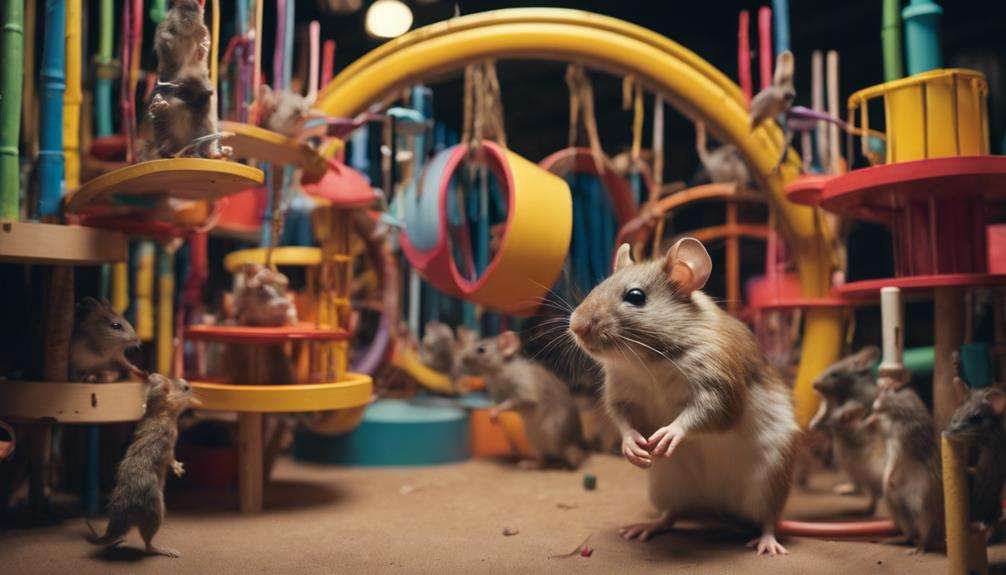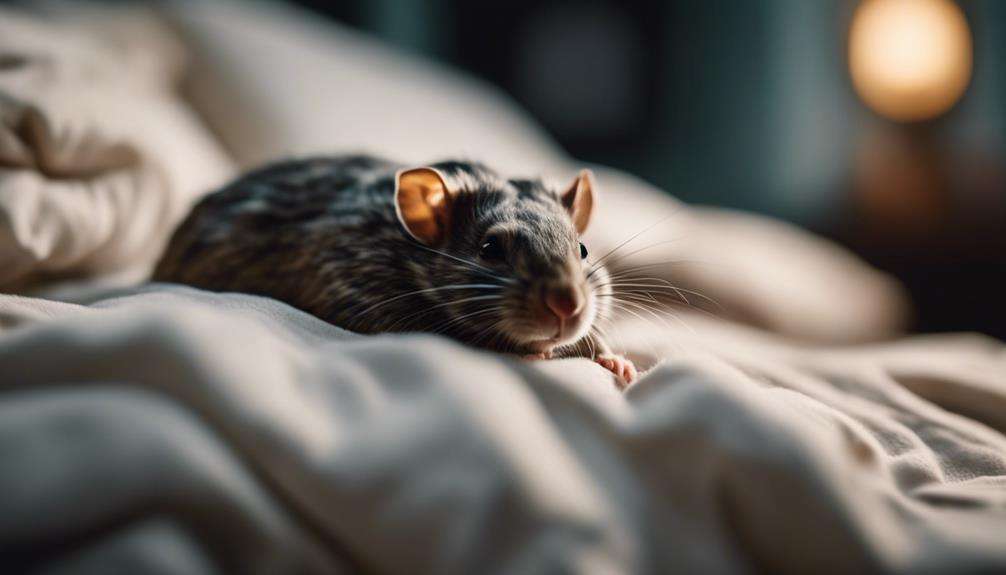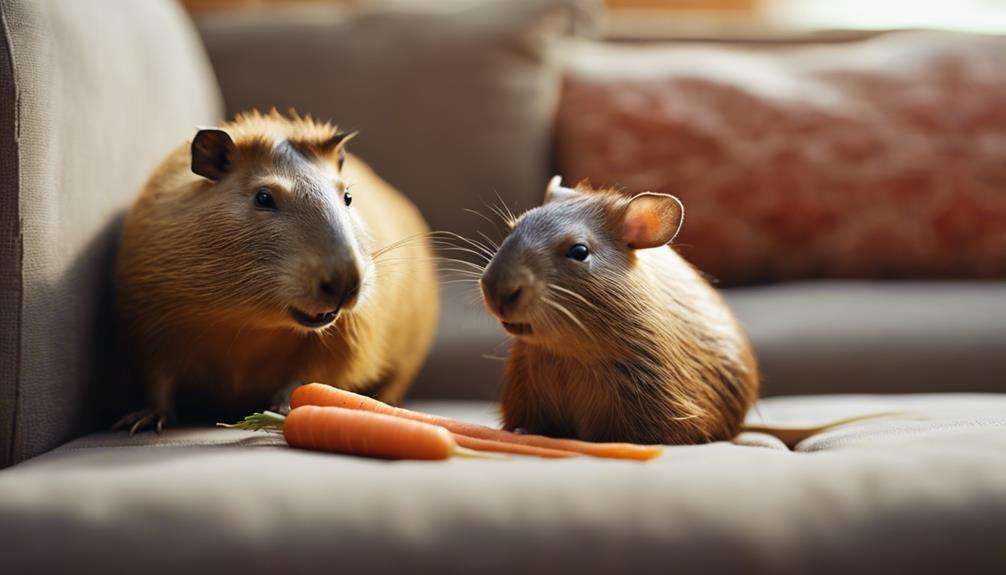Are you ready to embark on a journey of understanding and enriching the bond with your exotic rodent companion?
Discover the secrets to effective socialization techniques and nurturing trust with your unique pet.
From identifying high-value treats to decoding subtle stress signals, this guide equips you with the tools to create a harmonious environment and strengthen your connection with your exotic rodent.
Explore the nuances of communication, overcome challenges, and delve into stimulating activities designed to foster a deep and meaningful relationship with your furry friend.
Key Takeaways
- Use unique communication cues and rewards for positive socialization.
- Enhance trust, reduce aggression, and prevent boredom through socialization.
- Establish a routine, adapt the environment, and monitor progress for successful socialization.
- Understand body language, vocalizations, and build a bond with your exotic rodent.
Understanding Socialization for Exotic Rodents
To successfully socialize your exotic rodent, understanding their unique communication cues and body language is essential. Positive reinforcement plays a crucial role in this process. By using treats and gentle handling during interactions, you can help build trust and confidence in your exotic rodent.
When they exhibit behaviors you want to encourage, such as approaching you without fear, offering a treat as a reward reinforces this positive behavior. Encouraging playtime and exploration in a safe and controlled environment also aids in their socialization. Providing opportunities for them to engage in activities they enjoy, like climbing or running in a supervised setting, can help them feel more comfortable and secure in their new surroundings.
Benefits of Socializing Quirky Rodents
Socializing your quirky rodent can lead to reduced stress and fear, contributing to a happier and healthier pet overall. Bonding with your exotic pet has numerous benefits:
- Enhanced Trust and Communication: By spending time socializing your exotic rodent, you can build a strong bond based on trust and understanding. This can lead to more enjoyable interactions and a deeper connection between you and your pet.
- Reduction in Aggressive Behaviors: Well-socialized rodents are less likely to display aggressive tendencies. This can create a peaceful and harmonious environment in your home, making the overall experience of owning an exotic pet more pleasant.
- Prevention of Boredom and Loneliness: Socialization helps prevent boredom and loneliness in exotic rodents. By engaging with your pet regularly, you provide mental stimulation, which is essential for their well-being and happiness.
These benefits highlight the importance of socializing your quirky rodent to ensure a fulfilling and enriching relationship with your exotic pet.
Creating a Socialization Routine
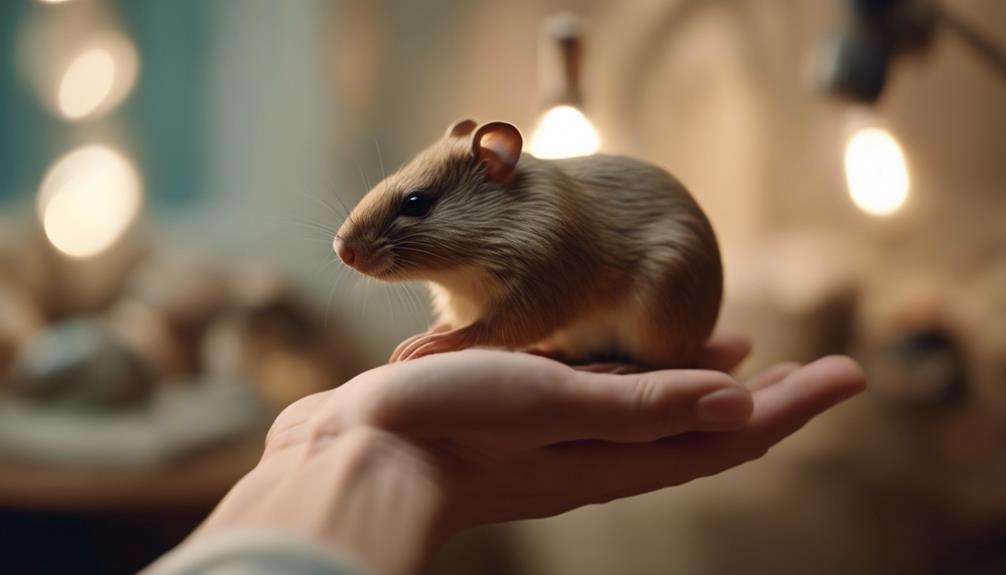
Craft a regular routine for socializing your exotic rodent to establish a strong bond and trust with your pet. Schedule daily handling sessions to help your exotic pet become familiar with your touch and presence.
Use treats and positive reinforcement during interactions to create a positive association with socialization. By gradually introducing new environments and stimuli, you can prevent fear and encourage curiosity in your exotic pet.
It's crucial to monitor your rodent's body language for signs of stress or discomfort during socialization sessions. Pay attention to cues such as freezing or excessive grooming, which may indicate unease.
Always end each socialization session on a positive note to reinforce trust and confidence in your exotic pet. Consistency and patience are key when socializing exotic pets, as it may take time for them to adjust to new experiences.
Adapting Environments for Socialization
Adapting the environment for socializing your exotic rodent involves providing a spacious and enriching habitat with various hiding spots and climbing structures for exploration and security. These intelligent creatures thrive in environments that cater to their natural instincts and behaviors.
Here are some key points to consider:
- Interactive Toys: Include toys that encourage mental stimulation and physical activity, such as tunnels and exercise wheels, to keep your exotic rodent engaged and entertained.
- Consistent Environment: Create a quiet and calm setting with stable lighting and temperature levels to help reduce stress and promote social interactions among your exotic rodent companions.
- Nutritious Diet: Offer a diverse range of nutritious foods and treats to incentivize positive associations with socialization sessions, ensuring your exotic rodent is both physically and mentally nourished.
Communication in Rodent Socialization
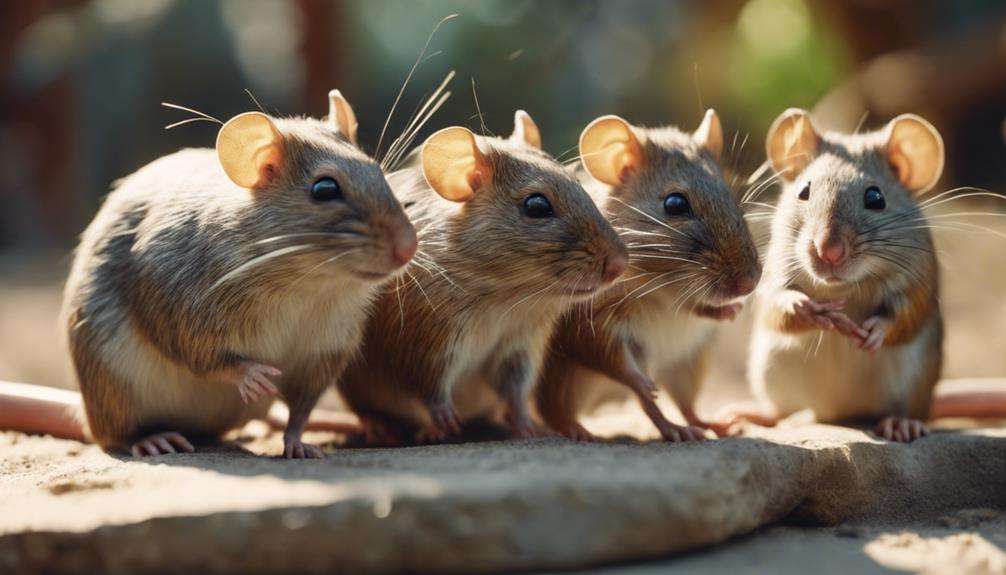
To effectively nurture the social connections of your exotic rodent, understanding the intricate language of rodent communication is paramount. Rodents communicate through a combination of vocalizations, body language, and scent marking. Squeaking, chirping, and chattering are typical vocalizations that convey various emotions or intentions. Pay attention to the context in which these sounds occur to decipher your rodent's feelings.
Additionally, body language such as grooming, tail wagging, and ear positioning are vital cues in rodent communication. Observing these subtle movements can give you valuable insights into your rodent's state of mind.
Scent marking is another crucial aspect of rodent communication, as it helps them establish territories and social hierarchy. By getting to know these different forms of communication, you can better understand your rodent's needs and facilitate successful socialization and bonding efforts.
Take the time to observe and interpret these signals to strengthen your relationship with your exotic pet.
Overcoming Socialization Challenges
Exotic rodents, being naturally shy creatures, often require patience and consistent effort to overcome socialization challenges successfully. When dealing with these exotic animals, it's crucial to understand their unique behaviors and needs to ensure a positive socialization experience.
Here are some key strategies to help you overcome socialization challenges with your exotic rodent:
- Establish a Routine: Providing a consistent routine for your exotic rodent can help them feel secure and build trust over time.
- Gentle Handling: Handling your exotic rodent gently and respectfully is essential in creating a safe and comfortable environment for social interaction.
- Use Positive Reinforcement: Utilizing positive reinforcement techniques, such as offering treats, can motivate your exotic rodent to engage in social activities and strengthen the bond between you.
Socialization Activities for Exotic Rodents
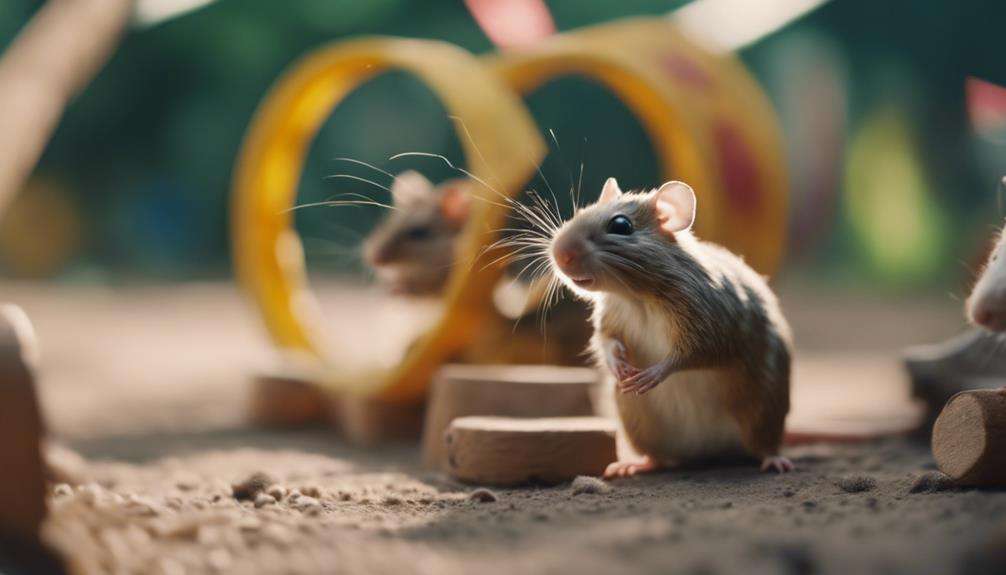
When socializing your exotic rodent, focus on proper handling techniques to build trust and familiarity.
Utilize enrichment toys like puzzle feeders and tunnels to engage their minds and encourage curiosity.
Create a stimulating playtime environment that offers new experiences to boost confidence and social skills.
Handling Techniques
Incorporate slow and gentle handling techniques when socializing your exotic rodent to establish trust and prevent stress. Take care to avoid sudden movements or loud noises during handling sessions, as these can cause your rodent unnecessary stress.
Offering treats during handling is a great way to create positive associations with human interaction, helping your rodent feel more at ease. Gradually increasing the duration of handling sessions can help your rodent become more comfortable with touch over time.
Remember to monitor your rodent's body language closely for any signs of stress or discomfort during handling, adjusting your approach accordingly.
- Avoid sudden movements or loud noises
- Offer treats during handling
- Gradually increase handling time
Enrichment Toys
To enhance the socialization experience for your exotic rodent, focus on selecting enrichment toys that cater to their unique behaviors and interests. Make sure the toys you choose are safe, durable, and specifically designed for exotic rodents.
Providing a variety of toys such as tunnels, climbing structures, and chew toys can keep them mentally stimulated and physically active. Rotate these toys regularly to prevent boredom and encourage exploration and play.
Puzzle feeders and foraging toys are great options as they mimic natural behaviors, promoting mental engagement and reducing stress. Remember to monitor the condition of the toys for wear and tear to ensure the safety and well-being of your exotic rodent during playtime.
Playtime Environment
Create a stimulating and safe play environment for your exotic rodent by setting up an enclosed area with a variety of interactive toys and enrichment items. To ensure a fun and engaging playtime experience for your exotic rodent and its family members, consider the following:
- Rotate Toys Regularly: Introduce new toys frequently to prevent boredom and keep your rodent's curiosity piqued.
- Include Physical Activity Elements: Add tunnels, climbing structures, and chew toys to encourage natural behaviors and physical exercise.
- Promote Mental Stimulation: Hide treats and food puzzles around the play area to stimulate foraging behavior and mental engagement during playtime sessions.
Monitoring Progress in Rodent Socialization
As you observe the interaction patterns between your exotic rodent and yourself, pay close attention to the frequency and duration of positive social engagements. These interactions should leave both you and your rodent feeling happy and healthy. Monitor how often your rodent initiates contact or responds positively to your attempts at interaction. Additionally, track their body language and behavior during these socialization sessions to gauge their comfort level. Note any improvements in their willingness to approach you or engage in interactive play, as these are positive signs of progress.
It's essential to keep a log of any setbacks or signs of stress that may arise during the socialization process. By documenting these instances, you can adjust your approach accordingly to ensure a gradual and positive experience for your rodent. Over time, reviewing these records will help you track your rodent's progress and make informed decisions to further enhance their socialization journey.
Frequently Asked Questions
What Is the Easiest Exotic Pet to Have?
For an easy exotic pet experience, consider hamsters. Their small size and low maintenance needs make them a popular choice. Their suitability as a beginner pet is due to their simplicity in care and interaction.
Is It OK to Keep Exotic Animals as Pets?
Keeping exotic animals as pets raises ethical considerations due to their specific care needs. Consult experts and research thoroughly before deciding. Remember, many exotic animals have challenging requirements that inexperienced owners may struggle to meet.
What Is the Most Popular Exotic Pet?
The most popular exotic pet is the African pygmy hedgehog. These adorable creatures are loved for their unique appearance and easy care. They make great companions due to their friendly nature and adaptability to domestic life.
What Kind of Exotic Pets Do You Think Would Be Best for the Average Person to Own?
When considering exotic rodents, guinea pigs are a popular choice for their sociable nature. Chinchillas are playful and can form strong bonds. Hedgehogs, though unique, are low maintenance and can be affectionate. These pets suit the average person well.
Conclusion
In conclusion, by understanding the benefits of socializing your exotic rodent, creating a consistent routine, adapting environments, and actively monitoring progress, you can effectively strengthen the bond with your unique pet.
Remember, patience, consistency, and positive reinforcement are key in building trust and promoting a happy, well-adjusted companion.
Stay dedicated to the process, and watch as your exotic rodent blossoms into a joyful and sociable member of your family.
